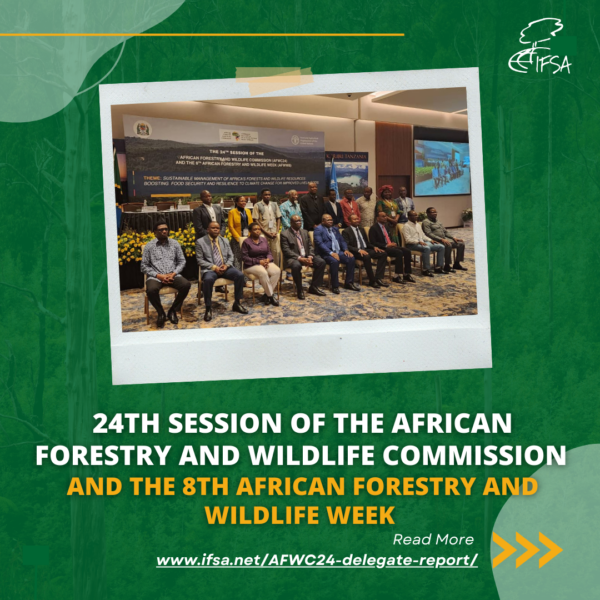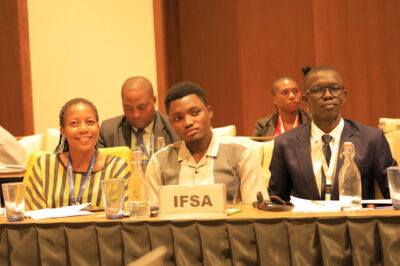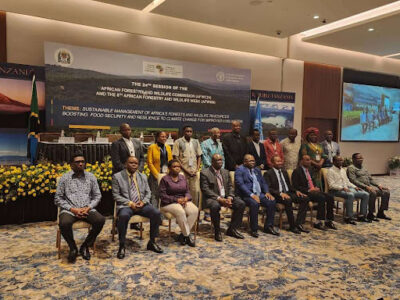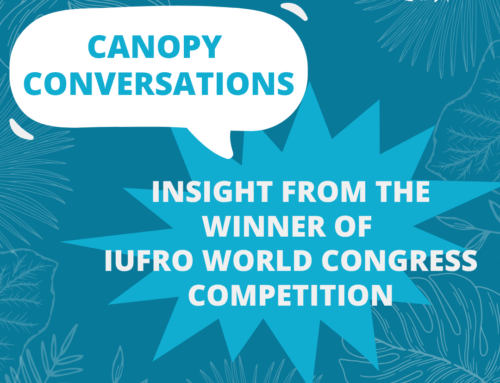
24TH SESSION OF THE AFRICAN FORESTRY AND WILDLIFE COMMISSION (AFWC24) AND THE 08TH AFRICAN FORESTRY AND WILDLIFE WEEK (AFWW8)
“Sustainable Management of Africa’s Forests and Wildlife Resources: Boosting Food Security and Resilience to Climate Change for Improved Livelihoods”
30th October- 03rd November in Arusha, Tanzania
Organizer: Food and Agriculture Organization (FAO)
IFSA Delegation Report
Authors; Chrispus Ongom, Bernadette Natukwasa
Introduction
About AFWC
The African Forestry and Wildlife Commission (AFWC) of the Food and Agriculture Organization of the United Nations (FAO) held its Twenty-fourth Session in Arusha, United Republic of Tanzania, from 30 October to 3 November 2023, at the kind invitation of the Government of the United Republic of Tanzania.
The aim of AFWC24 was to advise on the formulation of forest and wildlife management policy and to review and coordinate its implementation at the Regional level, to exchange information and advice on suitable practices and action concerning technical problems, and to make appropriate recommendations in relation to the foregoing.
“Sustainable Management of Africa’s Forests and Wildlife Resources: Boosting Food Security and Resilience to Climate Change for Improved Livelihoods” was the AFWC 24th session theme.
The Session was convened in hybrid modality. The Session was attended by 206 participants including representatives from 29 Members, and representatives from 4 institutions of the United Nations System, observers from 10 intergovernmental, international and regional non-governmental organizations, and Regional Economic Communities, Youth, academia and research institutions also attended.The event was marked by several sessions which can be accessed here.
IFSA Participation
IFSA was represented by three students, Eliudy Bagenyi a student from Sokoine University, Natukwasa Bernadette and Chrispus Ongom who are students from Makerere University. The IFSA delegates represented the youth at the session. Chrispus Ongom took part in the panel discussion on the Importance of Forestry and Wildlife Education and the Perception of Forestry career among the youth. This gave an insight on what should be improved to increase the number of youth in the two sectors. Chrispus Ongom already made a report on his personal experience as Panelist.

IFSA delegates at the AFWC24
Natukwasa Bernadette took part in a panel discussion on the relevance of technology in the Forestry and Wildlife sectors. She encouraged the various legislators to embrace the use of Artificial Intelligence to reduce the issues like insecurity and poaching where cameras and chips can be used to monitor the forests and store data.
IFSA’s presence at the conference enabled representation of the youth and future leaders since most individuals in attendance were old.
Core and Daily Agenda
Election of Chairperson AFWC 24th session.
The conference started with choosing a chairperson and Prof. Dos Santos Silayo from The United Republic of Tanzania was elected. Three Vice chairpersons were selected too and the event proceeded as per the agenda.
Topics were selected from the Forestry and wildlife sectors which guided the conference discussions.
Integrated Fire Management
The Secretariat presented the document FO:AFWC/2023/3, on “Integrated Fire Management in Africa: Approaches and Partnerships”. The Commission appreciated the initiatives taken by FAO to address fire management in an integrated manner.
The Commission invited Members to strengthen collaboration across the continent to manage and reduce wildfire through review, analysis, use of tools and field-based data. The Commission further requested FAO to support capacity building of its Members on Integrated Fire Management.
Forest Policy and Governance in Africa
The Secretariat presented the document FO:AFWC/2023/7, “Forest policy and governance in Africa”. The Commission took note of deforestation, land and forest degradation in Africa, highlighting the opportunities to advance solution-oriented governance processes.
The Commission urged Members to:
(i) spearhead education, vocational training and extension services in forest policies and strategies.
(ii) engage with the private sector to protect ecosystems and contribute to green cities as well as the adoption of climate-smart agriculture.
The Commission invited Members to hold multisectoral discussions and engage at national and subnational levels to improve sustainable management of forest and wildlife resources.
Wildlife trade, extension and research
The Commission took note of current activities associated with combating illegal wildlife trade especially within a transboundary context. The Commission invited Members and FAO to enhance collaborative research in combating illegal wildlife trade. The Commission encouraged Members to:
- Promote intra-African dialogue to exchange knowledge and current experiences in strengthening the sustainable use, management and trade of wildlife products, in collaboration with other relevant entities.
- Strengthen the capacity of institutions on wildlife management and trade to
facilitate the exchange of databases and monitoring systems, using existing
technologies, instruments and platforms to combat illegal wildlife trade.
Sustainable Wildlife Management in Africa
The Commission considered Secretariat document FO:AFWC/2023/4 “Sustainable wildlife management in Africa” and informed the Members of the inclusion of sustainable use of wildlife in several targets of the Kunming-Montreal Global Biodiversity Framework as well as the 2023-2025 Work Plan of the Collaborative Partnership on Sustainable Wildlife Management.
The Commission called upon its Members to analyze the scale and impact of human- wildlife conflicts in national and transboundary contexts and to collaborate with FAO in developing approaches to measure and monitor trends in effective human-wildlife conflict management and coexistence.
It further recommended FAO, subject to the availability of financial resources, to design a holistic capacity development programme for human-wildlife conflict management and promoting coexistence.
Bee Keeping and Value Chain Development in Africa
The Commission presented document FO:AFWC/2023/5 “Sustainable beekeeping value chain in Africa: Opportunities and challenges”, which informed about the potential of beekeeping as a way to combat deforestation and biodiversity loss while implementing Nature-based Income Generating Activities based on utilization of non-wood forest products.
The Commission invited Members to:
- Promote sustainable beekeeping practices and the development of national
beekeeping strategies to strengthen apiary value chains for food security, income
generation and environmental conservation.
- Improve data on production, consumption and trade, market information and traceability systems, to support beekeepers in marketing apiculture products and more tailored policies and interventions.
The Commission requested FAO to support Members in designing frameworks for
sustainable beekeeping and value chain development.
Update on Global and Regional Initiatives and Processes of relevance to the Regional Forestry Commissions.
The Secretariat presented documents FO:AFWC/2023/6.1 “Overview of major global processes and initiatives” and FO:AFWC/2023/6.2 “Input to FAO governance and FAO strategic planning”. A number of presentations were made in relation to the existing activities done in the two sectors. This involved the technological science involved in management of Forests and Wildlife.
The Geographical Information Systems experts presented on a panel how this technology has been integrated in Forestry and wildlife management. These showed great positivity in the technology and hoped for more support from FAO to increase use of GIS in nature management.
Various technology private investors who build drones were in attendance and these expressed the relevance of drone technology in Forestry and wildlife.
An IFSA delegate Natukwasa Bernadette gave a presentation on the relevance of technology in Wildlife and Forestry conservation which appeared in the Tanzania Times news here. She emphasized technology involvement as a space which will attract a number of youth in conservation activities. She listed building application games in relation to nature conservation as a strong tool to increase infant involvement in Environmental Conservation.
Delegation Feedback
It was a great honor to represent IFSA at the 24th session of AFWC in Arusha Tanzania. Some of the key Points to take home from the conference where;
- There is great effort needed to enhance wildlife conservation because a number of initiatives undertaken leave the wild animal’s lives at stake
- Carbon Trading is still an under exploited topic with scanty information among stakeholders. This makes African countries vulnerable to signing contracts which might cost them if they fail to meet the contract requirements.
- African Forestry and Wildlife Commision under FAO is very dedicated to developing the Forests and Wildlife of Africa. This is through their initiatives to support and collectively find solutions to problems facing these sectors in African countries.
- We appreciate our funders IFSA and FAO for catering for our travel to Arusha and the other services we received. It was such a great honor and you will be remembered for this opportunity you allowed us to have.
Delegation Outcomes
As IFSA delegates, we were able to achieve the benefits below;
- We were able to meet new foresters and experts who shared their experiences and contacts which increased our social capital.
- We got new friends from organizations like African Forestry Forum and other United Nation bodies in attendance which helped us learn about their work in the environment space.

A photo with the AFWC executive and other Non Government Organization representatives
Recommendation
I recommend IFSA gets to liaise earlier with FAO or other funding bodies to have more youth at such conferences because this increases the life of the solutions made and the ideas discussed during sessions.
Interested individuals can get to this link for more information about the session.
https://www.fao.org/events/detail/afwc-24
[/fusion_text][/fusion_builder_column][/fusion_builder_row][/fusion_builder_container]
